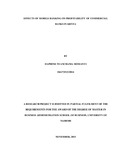| dc.description.abstract | Mobile banking offers customers an easy access to financial services by minimizing time
and distance to the nearest retail bank branches associated with traditional banking.
Mobile banking has been beneficial to both the banks and customers as it reduces the
banks overheads and transaction- related costs and its convenient and cheap as lesser fees
are charged on mobile transactions. The advent of M-banking was as a result of the
competition from telecommunication industry mainly Safaricom with their Mpesa
services and Airtel’s money transfer services. It also allows customers of a financial
institution to conduct balance inquiry, credit transfers, paying bills through a mobile
device which has increased convenience to customers. The study applied descriptive
research design. The target population was the 43 commercial banks operating in Kenya
as at December 2014. The total amounts transferred through mobile banking for the past
five years were collected and the number of active mobile banking users was regressed
against bank performance as measured by the return on assets. The study used secondary
data from the Central bank of Kenya and Kenya National Bureau of Statistics. Analysis
involved multiple regressions of variables under study. From the regression model of 5
years the study found a positive relationship between mobile banking and banks
profitability. The study results show that Mobile Banking has an influence on
profitability of commercial banks in Kenya. Based on the summary of the major findings
of the study it can be concluded that mobile banking offers banks several opportunities
for increasing revenues. The study recommends that commercial banks should therefore
continue to adopt new technologies which will improve their profitability. Policy makers
should also consider mobile banking in their formulation of policies because of the
technological developments and the expected switch from physical branch networks to
technologically supported banking services that will improve profitability which will
convert to better tax revenues for the government. The study also recommends an
increase in agency banking network in the country, to tap on the unbanked populations
since agency banking also had a positive impact on banks profitability. | en_US |

